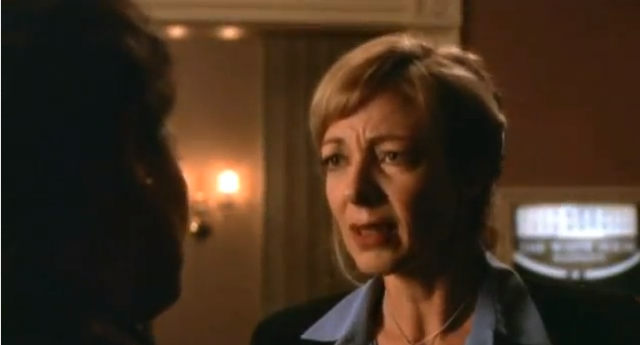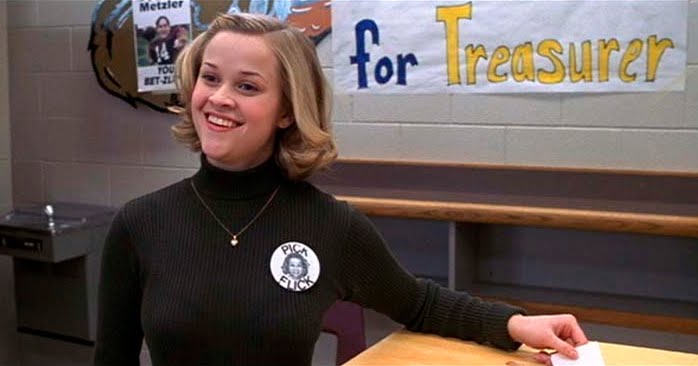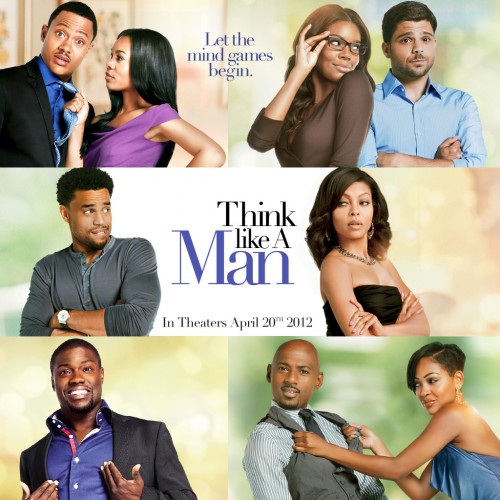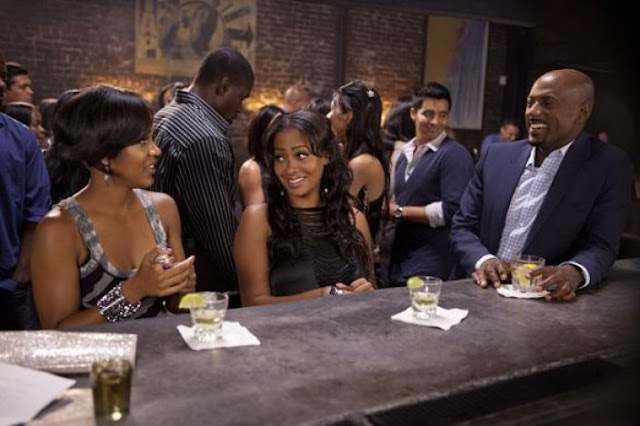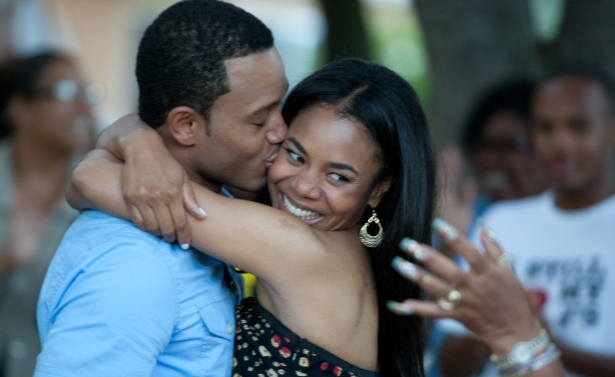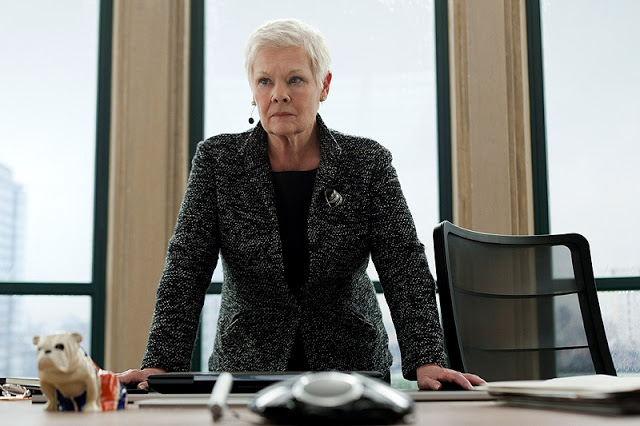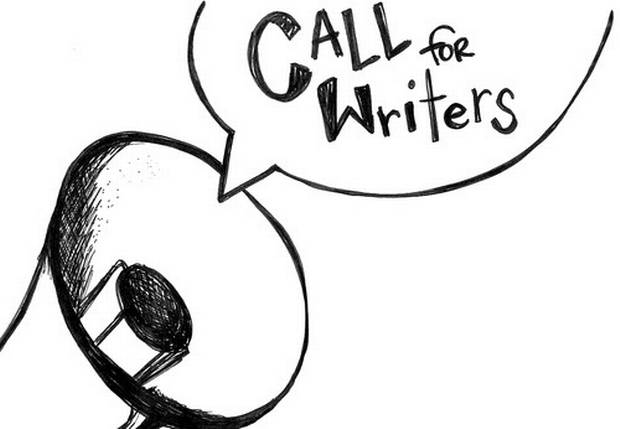 |
| Tracy Flick (Reese Witherspoon) in Election |
Guest post written by Carleen Tibbets. Warning: Spoilers ahead.
Election, the 1999 film directed by Alexander Payne and based on the novel by Tom Perotta, chronicles type A personality Tracy Flick’s (Reese Witherspoon) quest to become student body president and the unraveling of her social sciences teacher, Mr. McAllister (Matthew Broderick) as he attempts to thwart her campaign. Released on the heels of the Clinton-Lewinsky sex-scandal,
Election explores power, corruption, and moral gray area in the “wholesome” Midwest — seemingly representative of all that is safe, suburban, and pure.
Although he admits to taking pride in guiding his students and receiving “teacher of the year” honors several times over, McAllister has relatively little control over his personal life. He’s unable to impregnate his wife, Diane (Molly Hagan), commits adultery, and is ultimately done in by a student wound just as tight as her blonde curls. Tracy Flick makes her first appearance preparing for her campaign dressed in preppy sweater vest and loafers, yet despite the twinkle in her blue eyes, we soon learn that she’s much more calculating than she lets on. In her narration over the various clips of her high school curriculum vitae thus far, Tracy admits, “I volunteered for every committee as long as I could lead it.” We gain some insight into Tracy’s unwavering work ethic: she was raised by a single mother who taught her that being a woman meant that she would have to work twice as hard to actualize her dreams.
In McAllister’s civics class, Tracy obnoxiously and confidently thrusts her hand in the air when he asks the class to differentiate between morals and ethics, and McAllister is put off by her self-assuredness. The root of McAllister’s disdain for Tracy stems from the fact that she had an affair with his friend and colleague, Mr. Novotny (Mark Harelik). Novotny begins genuinely mentoring Flick, admiring her as a human being, and telling her, “Sometimes people like you have to pay a price or their greatness, and that price is loneliness.” However, this soon led to Novotny (seemingly) taking advantage of Tracy, as he puts “Three Times a Lady” on his stereo and leads her into the bedroom he shares with his wife, Linda (Delaney Driscoll). He confides in McAllister that their relationship has turned sexual. This is quickly discovered by her mother and the school administration, leading to Novotny’s forced resignation, divorce from Linda, and relocation to a different state. Sure, Tracy can accurately define and differentiate between ethics and morals, but she fails to exemplify them.
Determined to throw a monkey wrench into Tracy’s presidential win, which he refers to as a possible dictatorship, McAllister convinces naïve quarterback hero with a heart of gold Paul Metzler (Chris Klein) to oppose Tracy in the race. Despite Paul’s protestation to taking any votes away from Tracy, McAllister assures Paul of his being a “natural born leader.” Tracy accosts McAllister at his car after school with her list of signatures required to run, he drives off and throws it in a dumpster, certain Paul stands a fighting chance. Tracy’s chipper personality quickly falls away when she notices that Paul is now her opponent and she demands to know who put Paul up to challenging her.
We are then introduced to Tammy Metzler (Jessica Campbell), Paul’s adopted lesbian sister, a sophomore who decides to join the race for student body president after her girlfriend throws her over for Paul. In the assembly where each candidate pitches their platform to their peers, Tracy gives anecdotal accounts, Paul struggles to read his promises off an index card in a labored monotone, and Tammy gives an anarchy-fueled speech, capturing the “who cares?” mentality of most high schoolers, which results in the overwhelming support of the teen constituents.
Tammy’s unorthodox speech doesn’t bode well with the principal, who refers to her as a “little bitch” he wants out of the election. Fed up with Paul and Tammy detracting from the election she feels she deserves to win, Tracy has a meltdown and destroys her running mates’ posters. McAllister rightly suspects Tracy’s culpability, bringing up her near-destruction of Novotny in his interrogation. Tracy retorts with underhanded comments about McAllister’s infertility and Novotny getting mushy and attached to her. Yet, Tammy confesses to McAllister that she defaced the posters in hopes of getting sent to an all-girls school, is expelled, and taken off the ballot.
The night before the big vote, Paul prays for others, including his sister, while Tracy insists that she win, and truly believes she will. She even hand-frosts dozens of cupcakes with “Pick Flick” to hand her constituents. When it comes time to vote, Paul selflessly votes for Tracy, and she votes for herself. Meanwhile, McAllister’s personal life is completely in shambles, having spent the night in his car outside the home of his Novotny’s ex-wife and being thrown out by his own wife upon her learning of their affair. He must count the votes after two members of student government complete their tally, but mid-count he notices Tracy snooping around the classroom, jumping around giddily when one of the vote-counters gestures to her that she is the victor. Tracy wins by a single vote (presumably the vote she cast for herself), yet disgusted by her glee, McAllister wonders just how many people Tracy will step on in her ascent to the top. But why shouldn’t she rejoice in her victory? Is she not deserving?
He decides she must be stopped and throws two of her votes in the trash, declaring Paul the next president. That night, surrounded by all her trophies, medals, and inspirational posters, Tracy sobs uncontrollably. Her mother’s attempt to comfort her only comes out as criticism when she suggests Tracy might have won had she had better posters and slips her an anti-anxiety pill. Tracy’s misery is short-lived, however, when her missing votes are discovered. McAllister is called on the carpet for his attempt to take Tracy down, and resigns.
Tracy gets her wish to be president, topping her extensive list of extracurriculars, and earns a scholarship to Georgetown, where she expects to be surrounded with diligent worker bees such as herself. However, her expectations of finding those on her wavelength come crashing down when she realizes most students coast through on their parents’ dollar and with minimal effort.
McAllister encounters Tracy sometime later as she chats with a Republican representative and gets into his limo.
The film closes with McAllister, now a museum tour guide, being confronted with a miniature Flick-in-the-making on a school field trip shooting her arm up to answer a trivia question he poses to the group.
Election depicts several types of women from overachiever alpha-female Tracy to slacker Tammy to long-suffering, passive Diane and desperate Linda. Yet, what does it really tell us about how a woman should conduct herself? Are men afraid of driven women? Is society? Does being an ambitious woman who knows what she wants mean that she will indeed be lonely at the top?
Election also brings up the fact that in American society, qualified and talented women are perceived as a threat to the male status quo. Thirteen years after this film’s release, although Secretary Hillary Clinton’s displayed poise during the Lewinsky scandal and her own strides and accomplishments apart from Bill were quite remarkable, she did not earn the Democratic presidential nomination in 2008. Instead, she is ridiculed for her haircut and wardrobe choices. Republican VP nominee Sarah Palin’s beauty pageant days and “hockey mom” persona worked against her. Despite First Lady Michelle Obama’s humanitarian efforts, her every outfit is scrutinized by the media and her defined forearms are just as relevant as her Ivy-League credentials. Does it have to be one or the other? Must women be “frumpy” or asexual to be taken seriously in the political arena? Are attractive women less-qualified leaders? Why do we care whether the First Lady wears Manolo Blahniks or J. Crew pumps?
The saying “Behind a great man is an even greater woman” is thrown around regarding women in the political spotlight, but why are they lauded as pillars for their male counterparts to lean on instead of leaders in their own right? Can a woman wield clout regardless of with whom she’s linked romantically? I suppose what it all boils down to is what and whom a woman is willing to sacrifice and what labels she can live with in order to carve out a place for herself in a world still uncertain how to handle her success.
——
Carleen Tibbetts is a writer living in San Francisco. Her work has appeared in various publications including Word Riot, , and other journals.


